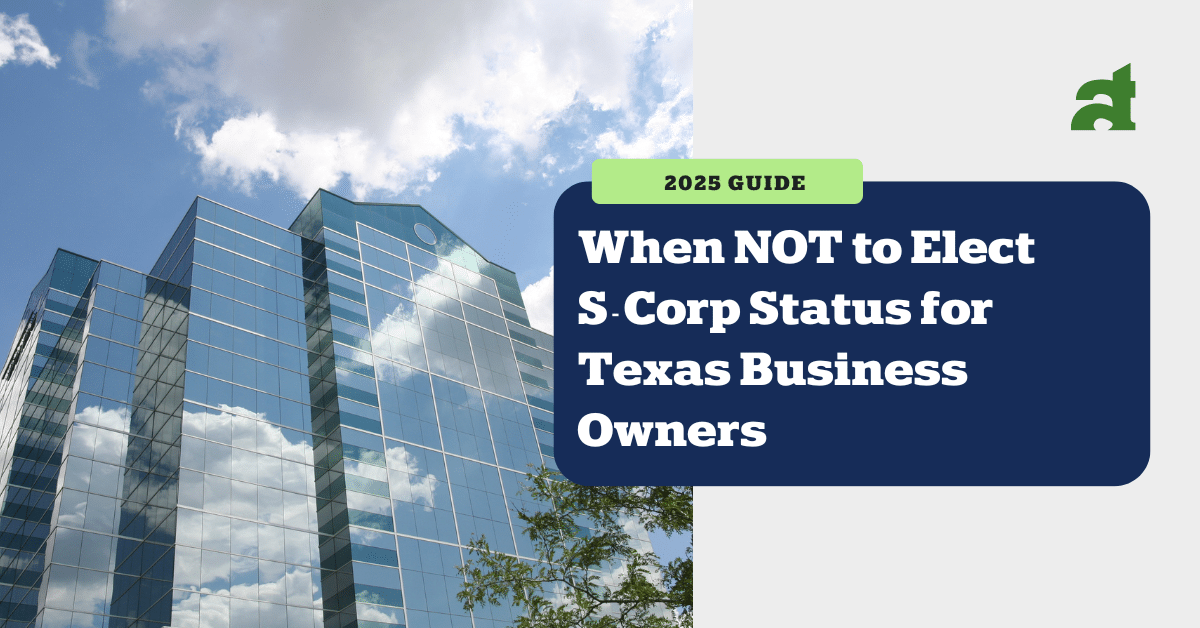
Most of the advice you’ll hear about S-Corps is focused on how they save business owners money. And yes, in the right situations, that’s absolutely true. But what’s often left out of the conversation is that S-Corp status doesn’t always make sense. For some business owners, the extra paperwork, payroll requirements, and IRS rules can cancel out the savings.
If you’re running a business in Fort Worth and thinking about filing the election, it’s worth looking at the situations where an S-Corp can actually hurt more than it helps.
The first big factor is how much profit your business is making.
Here’s the rule of thumb:
If you’re earning less than $60,000 a year in profit, an S-Corp usually doesn’t make sense. That’s because you’ll spend money on payroll software, filing fees, and an extra tax return that an LLC doesn’t require. Those costs can easily eat up the small tax savings you’d get from the S-Corp structure.
Example: Imagine your Fort Worth marketing business earns $40,000 in profit this year. With an S-Corp, you’d still need to pay yourself a “reasonable” salary (let’s say $30,000). By the time you add payroll taxes, accounting fees, and the S-Corp tax return, there’s little to no savings left.
For businesses still getting off the ground, it’s usually better to stick with a simple LLC until profits grow.
S-Corps work best when you have steady, reliable profits. That’s because you’re required to set a salary for yourself and run payroll on a consistent schedule.
But what if your income is unpredictable?
In these cases, setting and justifying a “reasonable” salary is more complicated. You may end up overpaying yourself in lean years or drawing IRS scrutiny if your salary looks artificially low.
Not every business owner wants to deal with extra layers of compliance. Running an S-Corp means:
If your business is still small and you’re wearing every hat already, this added admin can feel overwhelming. For many Texas LLC owners, the simplicity of just reporting profits on a Schedule C outweighs the potential tax savings.
Some business owners don’t take money out of the company for the first few years—they reinvest everything to grow faster. If that’s you, an S-Corp doesn’t add much benefit.
Why? Because the main savings of an S-Corp come from splitting your pay between salary (subject to payroll tax) and distributions (not subject to payroll tax). If you’re not drawing any income, there’s nothing to split—and no savings to be had.
In that case, electing too early just creates extra filings for no reason.
This one doesn’t apply to everyone, but it’s worth noting: S-Corps have strict rules about ownership. You can’t have more than 100 shareholders. You can’t have foreign investors. You can’t issue multiple classes of stock.
If your long-term plan involves bringing on investors or partners, an LLC or C-Corp often gives you more flexibility.
S-Corp status is not a one-size-fits-all solution. In Fort Worth, we see too many small business owners elect S-Corp because they’ve heard it’s a “tax hack,” only to realize later it costs them more in fees, payroll, and headaches.
Before you file the election, ask yourself:
If the answer is no, it may be smarter to wait. And when your business grows into higher profit territory, that’s the time to revisit the decision.